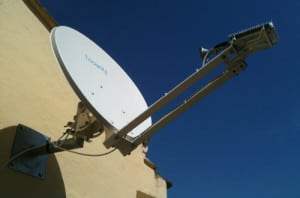Latest News
[Via Satellite 07-08-2015] Satellite Internet Service Provider (ISP) Europasat is in the midst of closing a series of acquisitions across Europe to expand across the continent. The U.K.-based company raised approximately 7.5 million Euros last year (approximately $8.3 million) with the intent of buying up other ISPs. The first of these acquisitions is to be announced soon, according to Simon Clifton, chief technology officer of Europasat.
This past May Europasat listed on the London stock exchange. Cleeve Capital acquired the company itself, which goes by the name Satellite Solutions Worldwide (SSW) and provides broadband services under the Europasat brand. Europasat is currently on its own acquisition spree, the impetus for which is twofold: to gain customers in new markets and to gain a preexisting presence where it did not before.
“The main reason for the listing was we could see that the market, the ISPs across Europe, was quite fragmented. There were lots of small players and we knew that the satellite owners wanted to team with a smaller number of larger safer, better funded, better organized companies. So we raised the money with a view to go down the acquisition trail,” Clifton told Via Satellite.
Europasat has customers in 32 countries, and is a top satellite broadband provider in the U.K. Clifton said that, going into the market, Europasat had lined up nearly 10 companies to acquire. These companies have not yet been disclosed.
“We are very focused on some of the new European countries. I think there has been a lack of traction for the satellite owners in terms of gaining the business that they would like in Eastern European countries, Clifton said.
Europasat provides satellite broadband from Avanti, SES and Eutelsat. Part of the reason behind the company’s boldness is a switch from Ku-band to Ka-band services. The shift began through Eutelsat’s Ka-Sat High Throughput Satellite (HTS), and prompted a full transition such that Europasat has now divested the majority of its Ku-band services. With greater Ka-band offerings, customers have shown more enthusiasm.
“I think the technology suffered a hangover really from the poor user experience and the price of the early Ku technologies that were around. I can remember what it was like 10 years ago with the cost of equipment and the quality of the actual experience,” said Clifton, adding that the experience “wasn’t that brilliant.”
Clifton pointed to Ka-band as a means of making satellite broadband more viable for ordinary consumers, and to HTS for driving down the cost for bit. He expects a concurrent drop in hardware costs as well. This enables Europasat to offer more competitive broadband options, he said.
“It means we can make our products more and more interesting to the consumer,” he said. “Whereas now, at the moment, we are offering consumer services that are peak speeds of 22 Mbps. We are just about to go live with 30 Mbps in the summer and, within 18 months, we see ourselves offering something in the region of 50 Mbps. We see data allowances going up significantly; we see a greater use of unlimited accounts, which is certainly in the U.K. a key driver of sales, and therefore the whole appeal of the product changes.”
Other business drivers for Europasat include organic growth, strategic partnerships and an increasing admittance by governments that satellite can effectively connect unserved and underserved citizens getting less than 2 Mbps by other means. Europasat has also seen traction in Satellite Newsgathering (SNG), having recently picked up a contract with Ireland’s national public broadcaster RTÉ. The company also provides SNG services to the BBC and Sky News, and has found interest among police forces for covert surveillance and mobile disaster units. Clifton said the company has had some success selling to police forces and the U.K. Ministry of Defence.
In Europe, Clifton cited Scandinavia as another market Europasat is highly interested in entering. Beyond Europe, Australia and India are also areas the company is looking to tap into through publicly funded projects. Europasat recently crested 11,000 customers in its existing markets, and anticipates future opportunities as desire for broadband access grows around the world.
“We are very confident that by the end of next year we will have something in the region of 100,000 customers. We see the market in Europe from our research being as many as 20 million people, so that’s really only scratching the surface,” he said.
Stay connected and get ahead with the leading source of industry intel!
Subscribe Now